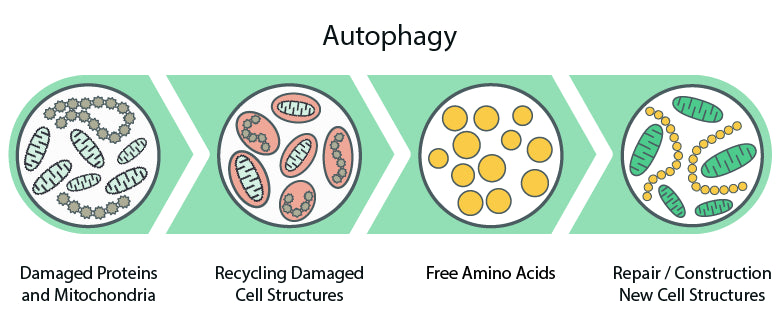In this blog, we dive into the essence of autophagy, exploring its significance, how it functions, and practical ways to activate this life-sustaining process through diet, fasting, and lifestyle adjustments.
What is autophagy?
Autophagy is a term derived from the Greek words for "self" and "eating". It is a fascinating and vital process that occurs at the cellular level in our bodies. It's our cells' way of cleaning out damaged components, which allows for the recycling of cellular materials and the generation of new, healthy cell parts.
This biological process is crucial for maintaining cellular health and, by extension, our bodies' overall health and vitality. As we age, the efficiency of the autophagy process can decline, accumulating damaged cells, which can contribute to various diseases and the ageing process itself.
Understanding how autophagy works helps us see how our bodies naturally work to keep us healthy and balanced. It also shows us how making certain lifestyle choices and changes can help support this critical process that keeps our cells clean and functioning well.
How does autophagy work?
Autophagy plays a pivotal role in our health by removing damaged cellular components, thus preventing them from accumulating and causing harm. This process is akin to an internal cleanup mechanism, ensuring that our cells operate efficiently. By removing the old, defective parts and recycling them into new, functional components, autophagy contributes significantly to cellular repair and renewal.
This is crucial for preventing a range of diseases, from neurodegenerative disorders like Alzheimer's and Parkinson's to heart disease and cancer. Moreover, it supports the immune system, helps manage inflammation, and plays a role in controlling infections.
Autophagy is foundational to maintaining the body's health and resilience against age-related decline and disease.
How can you induce autophagy?
So, how can you encourage your body to ramp up this vital process of autophagy? It turns out several lifestyle choices can naturally induce autophagy, making it a powerful tool for enhancing your health.
- Fasting or intermittent fasting is one of the most effective ways to kickstart autophagy. When you fast, your body depletes its glucose stores and starts looking for alternative energy sources, leading to the breakdown of cellular debris for energy.
- Exercise is another potent inducer of autophagy. Physical activity, especially high-intensity workouts, stresses your cells, stimulating them to start the autophagy process to repair and rejuvenate themselves.
- Adopting a diet rich in nutrients known to promote autophagy can significantly support this vital process.
Polyphenols, like resveratrol, quercetin, and curcumin are excellent for stimulating autophagy (1). Spermidine, a natural polyamine, also stimulates autophagy (2). And lastly Vitamin D has been researched to support autophagy (3).
- Resveratrol is found in red wine, grapes, and peanuts.
- Quercetin is present in onions, apples, and capers.
- Curcumin is the active compound in turmeric.
- Spermidine content is high in dry soy bean, chicken liver, green peas, corn, shell fish, and blue cheese.
- Though Vitamin D is famously obtained through sunlight exposure, certain foods like fatty fish (salmon, mackerel, and sardines), egg yolks, and fortified foods provide dietary sources of Vitamin D.
All these nutrients are also available as supplements.
How long do you have to fast for autophagy?
The duration of fasting required to initiate autophagy can vary depending on individual factors such as metabolism and previous dietary habits. However, research suggests that autophagy processes start to become significantly active in humans after about 16-18 hours of fasting. For more profound effects, extending the fasting period to 24 hours or more can further enhance autophagy.
It's important to approach fasting carefully and consider personal health conditions and nutritional needs. Consulting with a healthcare professional before starting any fasting regimen is advisable to ensure it's done safely and effectively. Remember, the goal is to support your body's health, so finding a fasting schedule that works for you is key.
References
- https://www.sciencedirect.com/science/article/abs/pii/S1568163712000529
- https://pubmed.ncbi.nlm.nih.gov/30306826/ & https://www.ncbi.nlm.nih.gov/pmc/articles/PMC3022763/
- https://www.sciencedirect.com/science/article/pii/S0955286321002618











